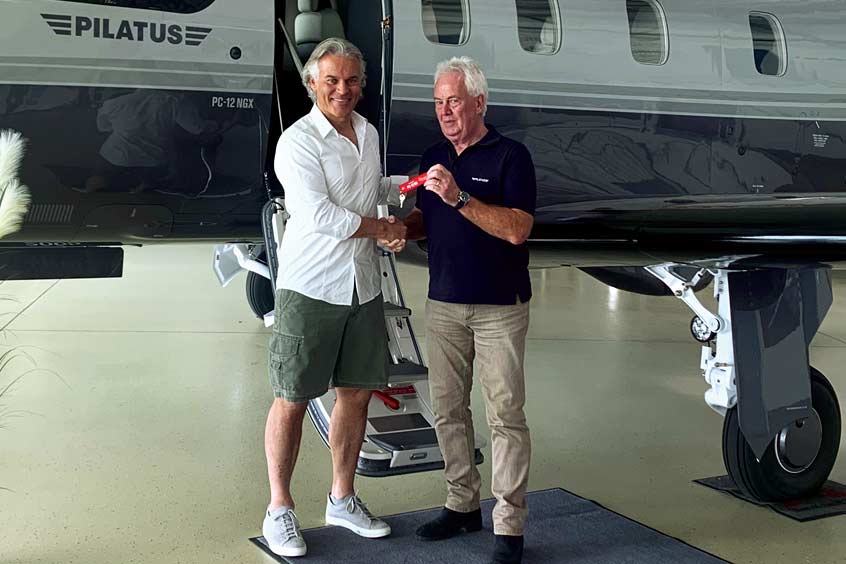Why visit ACE ’25?
Air Alliance GmbH
Aircraft
Pilatus Aircraft
Aircraft
Western Aircraft
Aircraft
BAN's World Gazetteer
Germany
Pilatus has handed over the first production PC-12 NGX aircraft to customers in the United States and Europe following its unveiling to the public at the 2019 NBAA-BACE in Las Vegas last autumn.
Capping off five years of quiet development and testing, Pilatus and the global network of authorised Pilatus sales centres have begun delivering the new PC-12 NGX advanced single-engine turboprop aircraft to customers around the world. Since the PC-12's introduction, more than 1,750 aircraft have been produced, with the aircraft holding the title of the business aviation industry's top-selling pressurised aircraft for the past four years in a row.
The first delivery of the PC-12 NGX in the United States went to HP director and former CEO Dion Weisler. Through the authorised Pilatus sales and service centre Western Aircraft in Boise, Idaho, Weisler upgraded to the new model from his 2017 model year PC-12 NG, ordering his NGX as soon as Pilatus opened the order book last October.
After the first flight in his new PC-12 NGX, Weisler said: “I really loved my NG, but the NGX takes the PC-12 to an entirely new level. There's something for everyone: passengers enjoy the modern new cabin, and the auto-throttle, single power lever, and electronic engine controls are a pilot's dream. I am also a staunch advocate for the new Traffic Alert and Collision Avoidance System II (TCAS) option with resolution advisories; the system proved its worth on our very first flight.”
In Europe, the first PC-12 NGX delivery went to Ulrich Byszio in Germany. Byszio, a pilot with a passion for all forms of aviation, moved from a popular light jet to his new PC-12 NGX. “The PC-12 NGX is the perfect aircraft for my travels around Europe. The combination of its speed, fuel efficiency, comfort and safety record make it ideal for both corporations and owner-pilots like myself. It offers an incredible level of versatility that can't be matched by anything else in this class,” he commented.
Additional PC-12 NGX launch customers from Brazil and the United States will be taking delivery of their new aircraft at the end of May and in June 2020.
Ignaz Gretener, VP general aviation of Pilatus says: “We are really excited to have both long-time and new members of the Pilatus family begin to take deliveries of the new PC-12 NGX. From the moment we announced it at NBAA-BACE, the response exceeded our expectations. Our goal was to maintain leadership of the business and utility turboprop market by continuously adding value and bringing new technology to the segment. These first deliveries of the PC-12 NGX bear witness to our commitment to the market. We look forward to building strong, long-lasting relationships with new customers.”
The PC-12 NGX is powered by the first Full Authority Digital Engine Control (FADEC) in a business turboprop aircraft. The PT6E-67XP engine on the PC 12 NGX features Pratt & Whitney Canada's Electronic Propeller and Engine Control System (EPECS). This solid-state, dual-redundancy control system simplifies engine start, reduces pilot workload and enables a high level of performance control and monitoring. While the PC-12 NGX's engine is still thermodynamically rated at 1,845 shaft horse power (shp), the EPECS allows cruise flat-rated power to be increased ten percent to 1,100 shp, and extends the time between overhaul 42 percent to 5,000 hours.
The maximum cruise speed of the PC-12 NGX is 290 knots (537 km/h), an increase of 30 knots (55 km/h) on the original model. Pilot workload is further reduced by the incorporation of single power lever, and a fully-integrated auto-throttle option on the PC-12 NGX, another first in a business turboprop aircraft.
In addition to the new engine and control system, the PC-12 NGX features an all-new passenger cabin inspired by Pilatus' PC-24. All-new seats, larger windows, indirect LED lighting, and a new air distribution system all contribute to a more modern, refined, comfortable passenger experience. The new engine technology also features a low speed propeller mode, reducing the propeller speed from 1,700 to 1,550 revolutions per minute, reducing cabin noise levels with little reduction in performance.